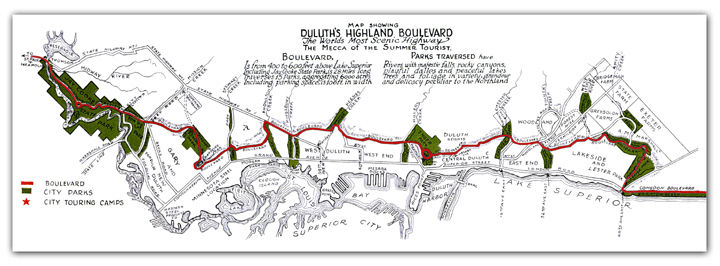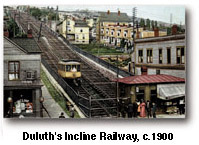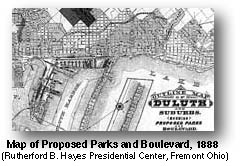

Duluth, Minnesota's
famous hilltop boulevard, and, in fact, much of the city's park
system that exists today, was conceived by William K. Rogers,
president of the city's first park board. Rogers hailed from Columbus,
Ohio, and was a close friend of Rutherford B. Hayes,  the 19th president of the United States,
serving as his private secretary during his presidency from 1877
to 1881. An ordained minister and lawyer, Rogers had first come
to Minnesota for health reasons back around 1856. He lived in
Hastings where he worked for a railroad company, practiced some
law, and dabbled in local politics. Later, when his friend Hayes
purchased property in Duluth (including the Hayes Block at the
southwest corner of First Avenue East and Superior Street), Rogers
often visited the northern city to manage monetary transactions
and upkeep of the property. While in Duluth, he became involved
in real estate and banking, serving as president of the State
Bank of Duluth. He was also involved in the building of an incline
railway running up the hillside from Superior Street to Ninth
Street along where 7th Avenue West is located today.
the 19th president of the United States,
serving as his private secretary during his presidency from 1877
to 1881. An ordained minister and lawyer, Rogers had first come
to Minnesota for health reasons back around 1856. He lived in
Hastings where he worked for a railroad company, practiced some
law, and dabbled in local politics. Later, when his friend Hayes
purchased property in Duluth (including the Hayes Block at the
southwest corner of First Avenue East and Superior Street), Rogers
often visited the northern city to manage monetary transactions
and upkeep of the property. While in Duluth, he became involved
in real estate and banking, serving as president of the State
Bank of Duluth. He was also involved in the building of an incline
railway running up the hillside from Superior Street to Ninth
Street along where 7th Avenue West is located today.
The incline served as a major connection to
the hilltop where property development was stagnant because of
its inaccessibility. The Duluth Highland Improvement Company--in
which Rogers held interest--owned a development at the top of
the hill, and was a major concern behind the building of the incline.
Former president Hayes also owned land near the proposed route.
The top of the incline intersected with what was then known as
Old Beach Road, a pathway following the natural terrace that ran
across the brow of the hill. The terrace had been formed by an
ancient gravel shoreline left by glacial Lake Nemadji, a deeper
ancestor of present-day Lake Superior.

William Rogers trekked many times across the terrace, surveying the hilltop acreage, climbing through creek ravines that cut down through the property. Sometimes, he would stand on the gravel ledge, above the bustle of the expanding city below, and gaze out over the sweeping view before him. The experience made quite an impression on the Ohio native.